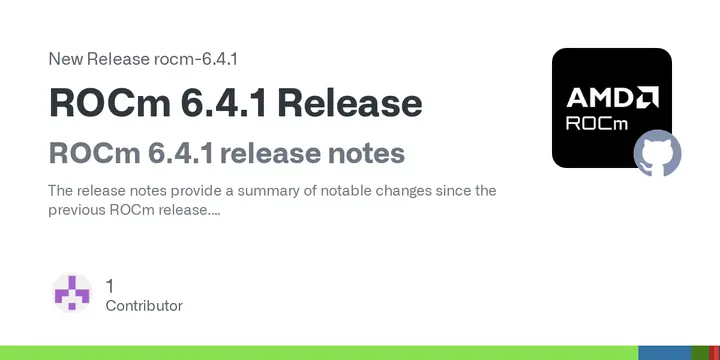Key updates in ROCm 6.4.1 include enhancements to the ROCm Offline Installer Creator, which now supports Debian 12 and improves user interface navigation. The ROCm Runfile Installer has been optimized for better performance and ease of use, with relaxed version checks and improved detection of previous installations. Additionally, the ROCm documentation has been expanded with five new tutorials focusing on performance testing for various AI models and frameworks, such as LLM Foundry, PyTorch, and JAX MaxText.
Operating system compatibility remains stable, but new support for AMD's RDNA4 architecture-based Radeon GPUs has been introduced, specifically for Ubuntu and RHEL distributions. The ROCm components have been updated with various version changes, and documentation continues to evolve for clarity and comprehensiveness.
Furthermore, the release notes detail significant changes, known issues, and anticipated future modifications, including the planned deprecation of ROCm SMI in favor of AMD SMI, which will receive ongoing support and functionality updates. This transition aims to streamline user experiences and ensure continued advancements in ROCm's capabilities.
In summary, ROCm 6.4.1 not only addresses existing bugs and enhances functionality across various components but also sets the stage for future developments, making it a critical update for users relying on AMD’s software for high-performance computing tasks.
Future Directions and Improvements
The ROCm team is focusing on further improvements, including:1. Enhanced Documentation and Tutorials: Continuing to build a comprehensive resource library for users to better utilize ROCm tools and capabilities, particularly in emerging AI and machine learning domains.
2. User Interface Improvements: Streamlining installation processes and making navigation in tools more intuitive to reduce the learning curve for new users.
3. Expanded Hardware Support: Ongoing efforts to broaden GPU compatibility, especially as new architectures are released, ensuring that developers can leverage the latest hardware advancements.
4. Deprecation and Transition Planning: As certain tools and components are phased out, clear guidance and support will be provided to help users transition smoothly to newer, more efficient alternatives.
5. Community Engagement: Encouraging user feedback and contributions to enhance the ROCm ecosystem and address any emerging challenges or needs within the community.
The continued evolution of ROCm signifies AMD's commitment to supporting high-performance computing and data science through robust software tools and an active development roadmap
ROCm 6.4.1 released
ROCm 6.4.1 is a recent release that brings several significant updates compared to the prior version. Significant updates encompass operating system and hardware support, versioning of ROCm components, identified issues, and forthcoming modifications. The AMD Instinct MI300X has introduced support for DPX partition mode within the NPS2 memory configuration. The ROCm Data Science Toolkit (ROCm-DS) is a comprehensive open-source software suite designed for high-performance data science applications, developed on the foundational ROCm platform. ROCm Offline Installer Creator 6.4.1 now enables users to select menu items in the GUI using the SPACEBAR or ENTER keys, introduces support for Debian 12, and resolves an issue related to "full" mode RHEL offline installer creation. ROCm Runfile Installer 6.4.1 brings improvements like easier version checks for installing on different systems, better performance in finding previous ROCm installations, and removes the extra opt directory created during installation. The ROCm documentation is consistently being enhanced to offer clearer and more comprehensive guidance tailored to a diverse range of user needs and use cases. Five new tutorials have been introduced, which include the guide for performance testing when training a model with LLM Foundry, the guide for performance testing when training a model with PyTorch, the guide for performance testing when training a model with JAX MaxText, the vLLM inference performance testing guide, and the PyTorch inference performance testing guide. Operating system support remains unchanged in this release.


